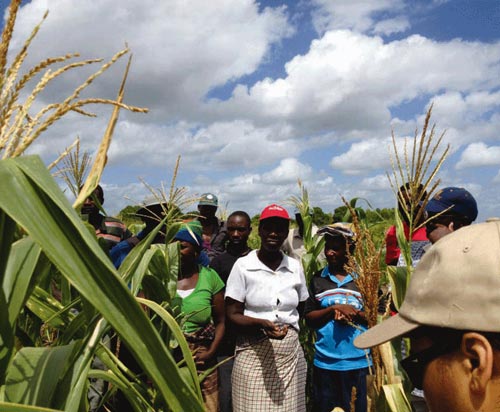 “Increasing Sustainable Agricultural Production in Mozambique through Drought Tolerant Maize and Conservation Agriculture” is a USAID-supported initiative bringing together two key components of CIMMYT’s work: Breeding for drought tolerance and sustainable land management to mitigate the effects of climate change.
“Increasing Sustainable Agricultural Production in Mozambique through Drought Tolerant Maize and Conservation Agriculture” is a USAID-supported initiative bringing together two key components of CIMMYT’s work: Breeding for drought tolerance and sustainable land management to mitigate the effects of climate change.
Demonstrations in rural farming communities of Mozambique are currently exhibiting four varieties, which were selected for drought tolerance in Harare, Zimbabwe, and are currently being multiplied by two seed companies in Mozambique: Lozane Seed and Dengo Commercial. Farmers are also being shown several different cropping systems for these new varieties: conventional (burning residues and significant soil movement), conservation agriculture (CA) with seeding into previously dug planting basins, and CA seeded with a pointed stick or jab planter and retaining of crop residues. Farmers are showing significant interest in these new methods, favoring the jab planter and dibble stick as the fastest way of sowing.
During 16-24 February 2012, CIMMYT scientists, partners from the University of Tennessee, and USAID representatives travelled to project sites in the Manica and Sofala Provinces, to monitor project progress and evaluate the quality of implementation. The demonstrations also feature growing maize in full rotation with cowpeas, a technique previously unused. “We never thought of growing cowpeas as a sole crop in rotation with maize and are amazed about the good crop stand and the yield we will get. We will try this on our own fields in the coming season,” said Raimundo Luis, a farmer from Sussundenga, Manica Province.
Maize is the staple food crop for farmers in Mozambique, with most growing just one crop, during the rainy season from November to April. Average yields are generally low, often less than one ton/hectare. However, with the advent of new varieties, such as the CIMMYT-developed short season open pollinated variety (OPV), ZM309, farmers can harvest their early seeded maize crops in February, a time when many grain stores are diminished. CA systems with residue cover enable greater conservation of soil moisture, and therefore allow farmers to plant a second maize or legume crop, for harvesting in June or July.
Double cropping will assure food security for farmers in Mozambique, and by planting protein-rich legumes as the second crop, nutrition of farm families can also be increased. The use of these methods will also reduce the risk of crop failure and increase productivity of the land.